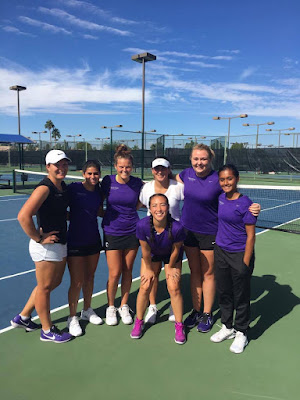Using the Law of Process to Help our Student-Athletes Become Better Leaders
 |
| The best leaders are the ones who help others up instead of tearing them down. |
My driving passion is to help make a difference in the lives of student-athlete – this is why I chose to pursue a career in college coaching. As a coach, my job is not only to prepare these young women to win tennis matches, but also to help build the next generation of leaders. There are countless leadership skills that student-athletes will get to learn once in college, but there is one critical skill that is overlooked, and that is Process. If more college athletes were exposed to the Law of Process, I believe they would be given a great competitive advantage.
The Law of Process says that nothing happens overnight.1 Instead, we must commit to a process to achieve our goals. If we know this to be true and obvious, why do so many of us continue to pursue instant gratification, the path of least resistance? We want results now, but often we aren’t willing to put in the hard work that is required. It would be easy to cast blame on the ‘like’ button or conclude that the new generation of kids are lazy, but the reality is, few of them are exposed to the Law of Process, which could truly revolutionize their approach and perspective.
This blog post aims to tackle three common problems student-athletes face when it comes to trusting Process and how we, as coaches can tackle these problems earlier rather than later in their college careers.
Problem #1: The belief that “leadership is for the select few.”
As a coach, I notice this belief ingrained in so many young people, and it really aggravates me. In John Maxwell’s book, The 21 Irrefutable Laws of Leadership, chapter 3 is dedicated to the Law of Process. He states that everyone has the chance to become a good leader, but it takes many years and lots of hard work to become one.1 I’ve seen too many players dismiss the importance of leadership and think to themselves “I’m not a leader. That’s someone else’s job.” Not at all! Everyone can be a leader. Everyone has strengths and those strengths are needed on a team. Find your role, think about what skills are needed in that role, and be the best at it.
Solution for Coaches:
- The first step to creating better leaders is to get to know your players as people. There are many personality tests now available that can give you further insight into what drives each individual, and to discover their areas of strengths and weaknesses. This can be a great start to helping them self-reflect on what type of leaders they can be. Investing time and energy into getting to know your players will help them see that you want only the best for them. In that way, you stand a better chance at developing trust with each player, and that they will hear what you have to say about what it takes to grow as a leader.
- Does your University offer a Leadership class? If so, find out where and when and get your student-athletes into the class! Don’t have one? Create one! Bring a speaker in every other week. Print out quotes from great leaders, find podcasts or YouTube videos that explain how to develop leadership skills. Even better, make them read a book such as Maxwell’s Laws of Leadership and have them discuss with you what struck them from each chapter of the book.
Problem #2: The belief, “I don’t have any mentors in my life.”
Everyone can get a mentor to help them know what they don’t know. They simply have to seek one out. Brian Cain refers to mentorship as a way to gain inexpensive experience. He says that by learning from others, you “speed up your learning curve and increase your chances for success by intelligently approaching the adversity you will endure.”2 Most people fail to recognize the value mentors can have in their life. Furthermore, a 1998 study on the importances of mentoring in the development of coaches and athletes suggests that the more coaches were mentored during their early coaching careers, the more “valuable knowledge and insights” they gained, which in turn shaped their coaching philosophy and enhanced their abilities.3 Mentors allow you to ask questions and seek specialized knowledge. They can have a huge impact on decisions you make in your career.
Solution for Coaches:
- As a coach, be a mentor. It’s that simple. You must put yourself in a position where student-athletes trust you and feel like they can come to you no matter the issue.
- Often, as a coach, there is no one necessarily coaching you. That’s why, as important it is to be mentors for our players, it is as equally important to have mentors ourselves. Having mentors, seeking knowledge, applying the new learned knowledge, is all part of the process of becoming the best leaders and coaches we can be. The Law of Process is an active system that needs to be applied day in and day out in order for you to grow. The best coaches and leaders are the one who assess their weaknesses and actively seek out answers day after day.
Problem #3: Not knowing the difference between and event and a process.
Coaches need to teach the difference between an event and a process to their student-athletes. An event is something that can inspire and motivate you in the moment. A process is something that will make you better in the long run. An event encourages decisions. A process encourages development. An event challenges you. A process changes you. An event is easy, while a process is difficult. Helping student-athletes understand the difference between an event and a process will help them understand that results don’t happen in one day, in one week or even in a season. They are in college for four years and with proper coaching and hard consistent work, athletes can achieve great things!
Solution for Coaches:
- Sit your athletes down and explain to them the difference between and event and a process. Make them find examples in their own lives.
- Before the start of the year, help players visualize what process they will undertake this year, to reach specific goals. Will they focus on their mental game, on a certain stroke, on their conditioning? If so, what steps must they take to get there? Remember, a process encourages development. It is our job as coaches to help them through this development.
Final Thoughts:
Everything about college athletics is a process. Not many athletes come in as freshman and everything just ‘clicks’. A player has four years to improve and learn and that’s why as a coach, I constantly try to emphasize to my players “trust the process.” As coaches, it is our responsibility to help these players grow, learn and improve. Thus, our behaviors and personal characteristics such as leadership styles can have a significant impact on a player’s coachability 4 and willingness to want to ‘trust in the process’. So, we must work day in and day out to gain our players trust, mentor them the right way, push ourselves for their benefit, and create a culture of growth on your team. By investing time in your players on and off the court or field, you are applying the Law of Process.
Reference:
1 Maxwell, J. (2007). The 21 Irrefutable Laws of Leadership: Follow Them and People Will Follow You. Tennessee: Thomas Nelson Publishing. 3.
2 Cain, B. (2012). The Mental Conditioning Manual: Your Blueprint for Excellence. Peak Performance Publishing. 12.
3 Bloom, G., Durand-Bush, N., Schinke, R., & Salmela, J. (1998), The importance of mentoring in the development of coaches and athletes. International Journal of Sports Psychology. 29. 267-281.
4 Giacobbi Jr., P., Whitney, J., Roper, E., & Butryn, T. (2002). College coaches’ views about the development of successful athletes: A descriptive exploratory investigation. Journal of Sport Behavior, 25(2), 164-181.



Comments
Post a Comment